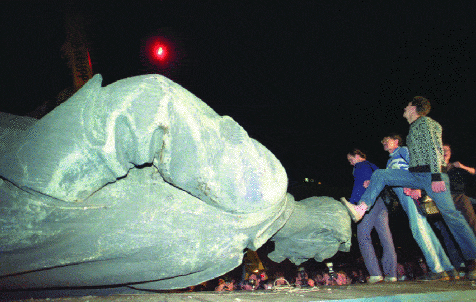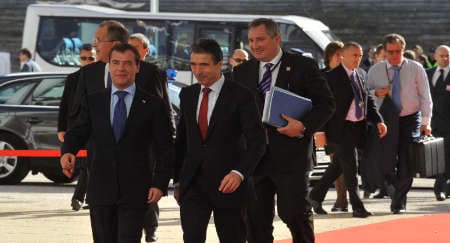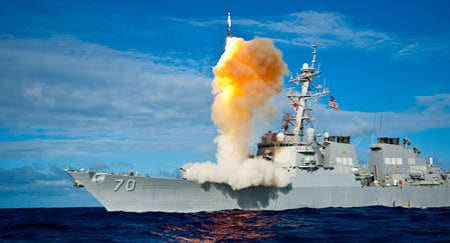Today is the moment for Russia and NATO to end seeing each other through the Cold War prism, argues Fyodor Lukyanov. Twenty first century challenges requires both sides to challenge of their 20th century hangovers.
Today, more than 20 years after the end of the Cold War, NATO and Russia are still unable to find common ground for outlining the contours of a future strategic cooperation.
This is very sad, because the parties urgently need each other, even if Moscow and NATO capitals are not fully aware of that. Russia and the Alliance are facing the same problems, although the reasons for them are opposite. Both Russia and NATO have proven unable, albeit in different ways, to give up the visions inherited from the past.
Russia is still recovering from geopolitical collapse as a result of the breakup of the Soviet Union. The Russian public at large and a big part of its political class are instinctively seeking proof that the 1991 disintegration didn’t mean Russia’s disappearance from the world stage as an important actor.
NATO has been seen as a successful rival and a symbol of Russia’s strategic defeat
Against this backdrop, NATO has been seen as a successful rival and a symbol of Russia’s strategic defeat, and this vision underlies the general perception.
Needless to say such an approach – the loser’s complex if put in psychological terms – can hardly contribute to a constructive interaction. The intellectual weakness of the Russian political elite, which cannot adjust itself to the new era, further aggravates the overall confusion.
Nonetheless, things are evolving. Amid the rapidly changing international landscape Russia is gradually overcoming the perception of NATO as the main threat to its security. Currently, the tenor of its relations with the Alliance is that of an echo of the past. It is not clear yet when the echo will die out, but it is becoming increasingly dissonant with other reverberations in the world, especially those coming from Asia.
NATO’s problems lie in the contrary approach. I believe it still cannot overcome the victor’s euphoria and continues to portray itself as the most successful military alliance ever, which could be right 15 years ago, but is misleading today. Despite its accumulated might, NATO is badly suited to cope with the 21st century challenges. Instead of facing reality, it is trying to bypass it by politically correct rhetoric and self-suggestion.
Until the late 2000s, the badly needed profound change of NATO’s goals and mission was settled through its enlargement. The mechanical extension reached its limits, but failed to bring answers to the new strategic dilemmas.
Both NATO and Russia have completed (or rather exhausted) their post-Cold War agendas and must now decide on their new self-identification in the 21st century
NATO has not become the world’s police officer, and the only remaining problem in its initial zone of responsibility – Europe – is unsettled relations with Moscow. Putting NATO-Russian relations on a solid footing, which should start with the sides’ abandoning outdated perceptions of each other, could offer a new purpose to NATO as a regional organisation.
To sum up, both NATO and Russia have completed (or rather exhausted) their post-Cold War agendas and must now decide on their new self-identification in the 21st century. It is time to re-position themselves vis-à-vis each other.
The latest developments have been rather discouraging. After six months of discussions about the European missile defense launched at a very promising NATO-Russia Summit last November, the Alliance officials finally and unequivocally rejected Russia’s proposal on cooperation. The reaction was predictable: the Russian officials expressed deep disappointment and warned about the risk of a new arms race.
Has half a year of debate been wasted? No, there is no doubt that attempting to implement this idea was worth it. The very fact that the issue of cooperation in such a delicate sphere of national security was raised in practical terms shows that the sides are indeed moving away from the Cold War logic.
"NATO cannot outsource to non-members collective defense obligations which bind its members"
NATO Secretary General Anders Fogh Rasmussen
Inertia and the power of prejudice are enormous on both sides, but the discussions left the rhetoric of faith and emotion behind, and entered the domain of reason. The discussion has exposed important details of the technological compatibility and political options.
“NATO cannot outsource to non-members collective defense obligations which bind its members,” NATO Secretary General Anders Fogh Rasmussen has said. “We assume that Russia is not ready to cede its sovereignty either.” The latter remark is particularly noteworthy. Many experts have pointed out that President Dmitry Medvedev’s almost sensational proposals for a “territorial missile defense” implied a possibility of discussing the hitherto immutable principle of Russia’s strategic self-sufficiency. In other words, the president proposed something no previous Kremlin administration had ever dared consider, not even during the romantic pro-Western period of the early 1990s.
Clearly, it would be unrealistic to expect a quick and smooth success. Moscow’s resounding attempt to resolve an issue that has a bearing on the fundamental aspects of security was probably doomed to fail. Any agreement in this sphere requires a very high level of mutual trust – something that is absent in Russian-US relations, despite a certain improvement reached in the past two-and-a-half years. Now that we understand there will be no breakthrough, we must draw the right conclusions and minimise damage from unrealised expectations. The first take was worth trying anyway.
Afghanistan cannot be a matter of long-term interaction between NATO and Russia, as their goals are different
Remarkably, the dialogue on the European missile defence unfolded the polemics of Russia’s hypothetical NATO membership. 2010 saw a lot of speculation about whether Russia could join NATO one day. Prominent analysts and former politicians took to the pages of Western publications to voice their opinion on the desirability and usefulness of Russia’s membership. The NATO Strategic Concept Expert Group, chaired by former US Secretary of State Madeleine Albright, held a lively discussion on the issue, although the conclusions of the “wise men” on this area were not included in the draft of the Alliance’s new strategy.
In Russia, pro-Western liberals from the Institute of Contemporary Development (INSOR) and even high-ranking officials are mulling the possibility. After the NATO Summit in Lisbon, where the atmosphere was quite friendly towards Russia, two high-ranking Russian officials acknowledged the possibility of Russia’s joining NATO in the future. These were deputy chief of the Kremlin staff Vladislav Surkov, and director of the Foreign Ministry’s policy planning department, Alexander Kramarenko.
The discussion got nowhere. Yet perhaps for the first time the sides offered specific arguments. They did not simply say “this is impossible because it can never happen,” but explained why it is impossible. In other words, the discussion has eventually gone beyond the rhetoric of faith.
The missile defence issue will inevitably reemerge in Russia’s relations with the US, which – naturally – shape the relationship between Russia and NATO. As long as the two countries possess nuclear arsenals surpassing that of the rest of the world several times over, the notion of strategic stability will come back to the agenda, however obsolete it may appear. But in its current form, missile defence remains bound up with the broader Euro-Atlantic context. In other words, it has not broken free from the Cold War’s powerful inertia.
This discussion may see new light in a couple of years’ time, when everyone involved understands that Europe is no longer a strategic theatre. With Asia rapidly replacing Europe, missile defence will also be increasingly associated with that region. This means that the US-Russian dialogue will also undergo a change because Moscow and Washington play completely different roles in Asia than they do in Europe.
The underlying principle of military-political alliances in the 21st century will most likely differ from that of the 20th century, when they were based on shared ideology or values. In the coming decades, alliances will probably be formed to achieve a concrete objective. As Donald Rumsfeld once said, “the mission determines the coalition – the coalition must not determine the mission.” This phrase proved to be more lasting than his political career.
Incidentally, even if we assume that Russia’s membership in NATO is realistic, it would do nothing to address the real security problems of the 21st century. They should be dealt with in a new format – ideally in a trilateral format involving Russia, China and the United States. Although the three powers have different interests and approaches, they have the strategic weight necessary to solve problems in Central Eurasia, Russia’s Far East and the Pacific region.
America’s European allies are unlikely to get involved until they disentangle from the Afghan quagmire. The reasons for that were exhaustively given by outgoing US Defence Secretary Robert Gates in a speech in Brussels in June, highlighting overstretch and low defence spending.
Afghanistan cannot be a matter of long-term interaction between NATO and Russia, as their goals are different: the Alliance is looking for opportune ways to leave, while Russia is seeking long-lasting solutions in its neighbourhood.
But currently their interests coincide, and the coming years will provide good opportunities for managing the transition jointly. This will increase mutual trust and the level of operational compatibility needed for cooperation afterwards. But before this, NATO and Russia have first to adjust themselves to the new challenges



